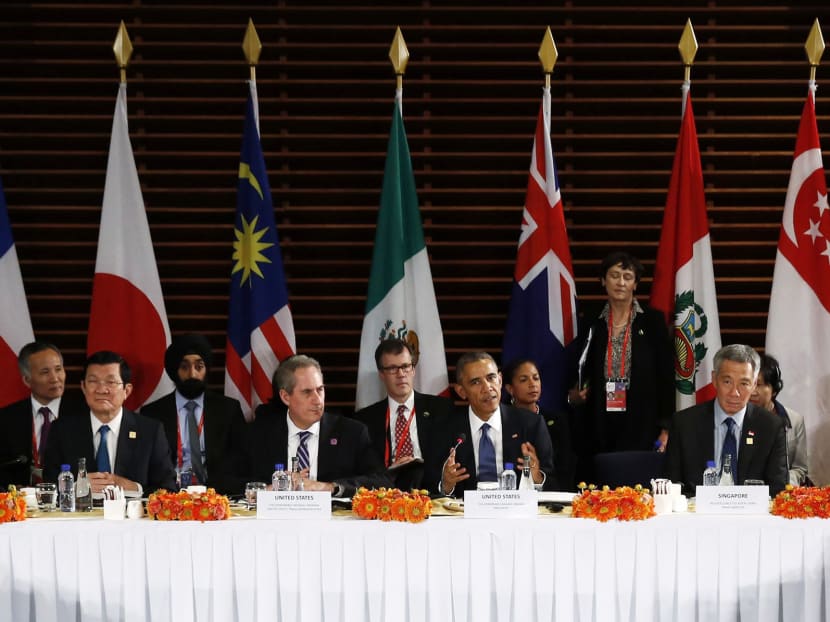Failure to ratify TPP will be a big blow to US, says PM Lee
SINGAPORE — A failure by the United States to ratify the Trans-Pacific Partnership (TPP) trade pact will be a big blow to America and its credibility, said Prime Minister Lee Hsien Loong, who added that the US ratification now seemed unlikely to be done by January, when President Barack Obama steps down from office.

U.S. President Barack Obama (C) meets with the leaders of the Trans-Pacific Partnership (TPP) countries in Beijing November 10, 2014. Photo: Reuters
SINGAPORE — A failure by the United States to ratify the Trans-Pacific Partnership (TPP) trade pact will be a big blow to America and its credibility, said Prime Minister Lee Hsien Loong, who added that the US ratification now seemed unlikely to be done by January, when President Barack Obama steps down from office.
In an interview with Time magazine editor-at-large Ian Bremmer, Mr Lee noted that the US election rhetoric on trade had been particularly “nasty and harsh”.
“I think Hillary (Clinton), if she wins, will have a lot of things to un-speak, which she will find very difficult to do. I think TPP will be a casualty if it is not settled by January,” said Mr Lee. When Mr Bremmer said that it probably would not be, Mr Lee replied: “Probably will not be.”
“That would be a very big setback for America,” he said, noting that Mr Obama did not push for the TPP very hard domestically and expended the political capital until “quite late”, adding that the outgoing US leader may have “left it too late”.
Mr Lee said that while Washington “can move aircraft carriers around”, this has to be in support of “deeper economic and broad relationships”.
“You do not do things which the Chinese do,” he added. “The Chinese go around with lollipops in their pockets. They have aid, they have friendship deals, they build you a Prime Minister’s office or President’s office, or Parliament House or foreign ministry.”
Instead, the Obama administration has negotiated the signing of the TPP by 12 Pacific Rim countries with a collective population of about 800 million and a 40 per cent share of world trade.
“It shows that you are serious, that you are prepared to deepen the relationship and that you are putting a stake here which you will have an interest in upholding,” said Mr Lee.
But if the US now failed to deliver on the TPP — especially since some countries, such as Japan, are currently ratifying the pact — then the US’ credibility will be hit.
“Your standing goes down with many countries around the world,” he said. “After you have gotten Vietnam to join, after you have gotten Japan to join, after (Japanese Prime Minister Shinzo) Abe has made very difficult arrangements on agriculture, cars, sugar and dairy. Now you say, ‘I walk away, that I do not believe in this deal.’ How can anybody believe in you anymore?.”
Last month, during a visit to Japan, Mr Lee had said that he hoped Mr Obama could get the TPP ratified before his term ends, or during a “lame-duck” session of Congress. That is when the US Congress meets after a successor is elected but before the new president’s term begins. However, the US Senate is not expected to vote on the pact this year, despite Mr Obama’s ramped-up campaign to persuade Congress to endorse the TPP.
The TPP’s future has also been plunged into doubt as the two leading US presidential candidates, Mrs Clinton and Mr Donald Trump, are not in favour of ratifying the agreement. They argue that it would kill American jobs and does not guard against currency manipulation.
In his interview with Time, Mr Lee said that the significance of the TPP goes beyond trade to strategic issues such as North Korea’s nuclear and ballistic programmes.
“The key thing in North-east Asia is North Korea. They are unpredictable, they are developing their nuclear capabilities and their missiles. You do not want the South Koreans to do that, you do not want the Japanese to do that. What is the restraint on them?” said Mr Lee. “It is your credibility as an ally and as a deterrent. I do not think failing to ratify the TPP will strengthen that at all.”






